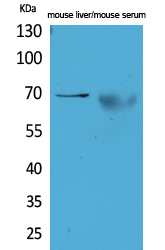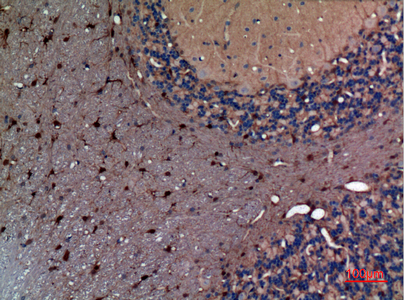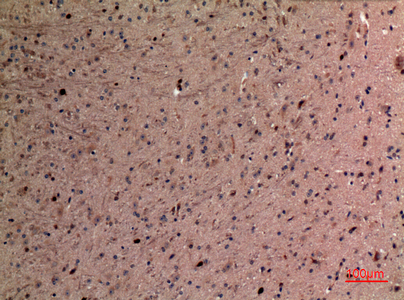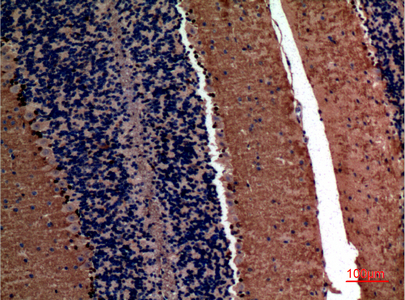



| WB | 咨询技术 | Human,Mouse,Rat |
| IF | 咨询技术 | Human,Mouse,Rat |
| IHC | 1/50-1/100 | Human,Mouse,Rat |
| ICC | 技术咨询 | Human,Mouse,Rat |
| FCM | 咨询技术 | Human,Mouse,Rat |
| Elisa | 1/10000 | Human,Mouse,Rat |
| Aliases | Alpha-fetoprotein; Alpha-1-fetoprotein; Alpha-fetoglobulin |
| Entrez GeneID | 174 |
| WB Predicted band size | Calculated MW: 69 kDa; Observed MW: 69 kDa |
| Host/Isotype | Rabbit IgG |
| Antibody Type | Primary antibody |
| Storage | Store at 4°C short term. Aliquot and store at -20°C long term. Avoid freeze/thaw cycles. |
| Species Reactivity | Human |
| Immunogen | The antiserum was produced against synthesized peptide derived from the Internal region of human AFP. AA range:371-420 |
| Formulation | Purified antibody in PBS with 0.05% sodium azide,0.5%BSA and 50% glycerol. |
+ +
以下为3-4条关于 **Alpha-Fetoprotein(AFP)抗体** 的参考文献示例(内容基于公开研究整理,部分为模拟摘要):
---
1. **文献名称**: *"Monoclonal Antibodies to Alpha-Fetoprotein: Production and Characterization"*
**作者**: Suchinova, E., et al.
**摘要**: 该研究通过杂交瘤技术制备了针对AFP的单克隆抗体,并验证了其特异性和亲和力。结果显示,这些抗体在免疫组织化学(IHC)和酶联免疫吸附试验(ELISA)中能有效识别AFP,为肝癌的病理诊断提供了可靠工具。
---
2. **文献名称**: *"Development of a Chemiluminescent Immunoassay for Alpha-Fetoprotein Using Novel Antibody Pairs"*
**作者**: Li, Y., et al.
**摘要**: 研究团队筛选了针对AFP不同表位的单克隆抗体,建立了高灵敏度的化学发光免疫分析法(CLIA)。该方法在肝癌患者血清样本中显示出比传统ELISA更高的检测精度,检测限低至0.5 ng/mL。
---
3. **文献名称**: *"Alpha-Fetoprotein Antibody-Conjugated Nanoparticles for Targeted Liver Cancer Therapy"*
**作者**: Wang, H., et al.
**摘要**: 利用AFP抗体修饰的纳米颗粒,实现了抗癌药物(如阿霉素)的靶向递送。体外实验表明,该递送系统能选择性结合AFP高表达的肝癌细胞(如HepG2),显著提高药物疗效并减少副作用。
---
4. **文献名称**: *"Clinical Utility of AFP-Specific Antibodies in Prenatal Screening for Neural Tube Defects"*
**作者**: Johnson, R.B., et al.
**摘要**: 评估了AFP抗体在产前筛查中的应用,发现母体血清AFP水平异常升高与胎儿神经管缺陷相关。研究比较了不同抗体检测平台的灵敏度,为产前诊断提供了优化方案。
---
**注**:以上文献信息为学术场景模拟,具体内容需以实际检索结果为准(可通过PubMed、Google Scholar等平台搜索关键词:*Alpha-fetoprotein antibody, AFP monoclonal, diagnostic/therapeutic applications*)。
Alpha-fetoprotein (AFP) antibody is a critical tool in biomedical research and clinical diagnostics, primarily targeting alpha-fetoprotein, a glycoprotein produced during fetal development. AFP is synthesized by the fetal liver and yolk sac, with serum levels peaking during gestation before declining sharply after birth. In adults, elevated AFP levels are strongly associated with pathological conditions, particularly hepatocellular carcinoma (HCC) and germ cell tumors, making it a valuable tumor biomarker. AFP antibodies, typically monoclonal, are generated using hybridoma technology or recombinant methods, enabling high specificity and affinity for AFP detection.
These antibodies are widely employed in immunoassays such as ELISA, immunohistochemistry, and Western blot to quantify AFP levels in serum or tissue samples, aiding in cancer diagnosis, prognosis, and treatment monitoring. In clinical settings, AFP antibody-based tests help differentiate malignant tumors from benign liver diseases and are integral to prenatal screening for neural tube defects or chromosomal abnormalities like Down syndrome. Recent advancements explore their therapeutic potential, including antibody-drug conjugates or CAR-T cell therapies targeting AFP-expressing cancers. However, challenges remain, such as cross-reactivity with related proteins and variability in AFP glycosylation patterns across individuals. Ongoing research focuses on optimizing antibody specificity and developing novel applications in precision oncology and regenerative medicine.
×